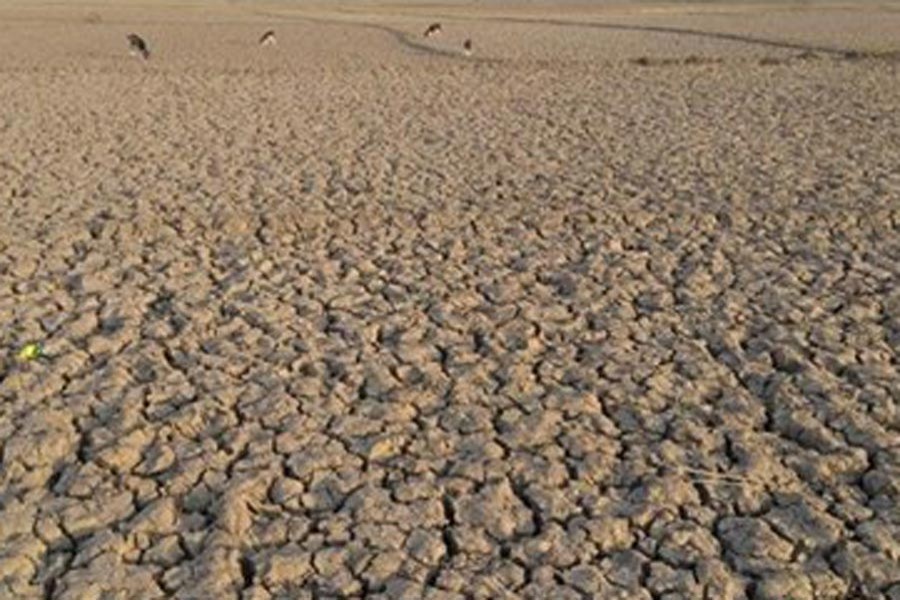RAJSHAHI, Dec 12: The historical Beel Kumari, a large water body enriched in bio-diversity with rare, aquatic plants and fauna, has started drying up this year.
The beel is also a means of livelihood of thousands of fishermen and farmers of Tanore upazila. The water level of the beel never depleted to such a low point during the last 50 years.
It is learnt, due to scanty rainfall during the last several years and blockage of water channels connecting the beel, the huge water body of the district has dried up during this winter.
The fishermen who used to catch fish and irrigate their farms, have become disheartened to see such a condition of the beel.
In recent past, the Beel Kumari was filled with diverse aquatic plants including water lily, lotus, 'shaluk', 'Dhap', 'Shinger' and various kinds of water hyacinth.
Different varieties of local breed of fish and other aquatic animals were seen to live inside those aquatic plants. But, now all those are a part of history.
The Shiba river criss-crossed the Beel Kumari.
The only mode of transport of nearly one hundred villages surrounding the beel was through boats.
Various tasty fishes including pabda, bheda, gojar and patashi are no more seen to breed and live in this water body.
Due to construction of Tanore-Mohanpur link road through the beel and erecting of barriers inside the beel, the transport through boat have remained suspended making several hundred boatmen unemployed.
According to sources, for the last ten years, local administration with the help of local fishermen was holding Fish Fair of Beel Kumari during the month of December to uphold varieties of fish found in the beel.
Thousands of people from surrounding districts used to throng the Fish Fair to purchase varieties of local varieties of fish.
But due to drying up of most of the areas of the beel, uncertainly looms over holding the fair this year.
The organisers of the Fish Fair informed, the fair which used to be held centring fishes of Beel Kumari every year is unlikely to be held this year because there is no water and fish in the beel this year.
According to a recent survey, 4,250 people of Tanore upazila are direct dependent for livelihood on fish of this beel.
Moreover, some locals Mohanpur upazila were also depended on this beel to earn their livelihood. But, those people are now utterly disappointed at the drying up of the beel.
Mihir(45), a fisherman of Gokul village informed, they used to earn their livelihood by fishing in the beel throughout the year.
The fishermen living beside the villages of the beel were now not being able to catch and collect sufficient fish from the beel though their dream of maintaining family is goes with the fish of the beel.
The fishermen, who from their early childhood knew how to catch fish are being forced to change their profession due to drying up the water of the beel.
Now it has become a challenge for them to survive with the ancestral profession and also to take up and survive in a new profession.
With the fish they used to catch from the beel was a means of earning of their daily food, education expenditure of their children, treatment cost of family members, purchasing of dresses, repayment of micro credit, maintaining relationship, social and religious ceremonies and daily transportation cost of all family members and all other expenditure of the family.
Not only the fishermen but also farmers of the villages surrounding the beel were also disappointed. Due to shortage of water in the beel, the cultivation of Rabi crop in the field has been affected adversely.
Farmers were apprehending further depletion of water level during the next Boro season this year.
Shafiqul islam, a boat seller of Talanda Bazaar informed, this year there was scanty rainfall.
He further said, last year he had sold 400 boats but this year he has only sold 200 boats.
Akram Hossain, chairman of Barind Multipurpose Development Authority said, Beel Kumari is a traditional water body of the country. Thousands of people earn their livelihood centring this beel.
He expressed his determination to excavate the beel to retain its water as well as biodiversity.


